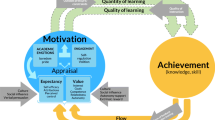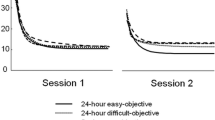Abstract
The present study focused on delineating the parameters under which intrinsic motivation leads an individual to reengage an activity from those that result in the Zeigarnik effect. In a posttask free-choice period, participants not completing the experimental task displayed more reengagement behavior than participants completing the task (the Zeigarnik effect). When participants were also provided self-efficacious performance feedback via a prearranged competitive outcome manipulation, there was no evidence of the Zeigarnik effect, while there was support for intrinsic motivation from competent self-efficacious performance feedback. Results were discussed in terms of distinguishing between intrinsic motivation and the Zeigarnik effect as sources of reengagement motivation. It was concluded that, in the presence of self-efficacious performance feedback, the competent-incompetent impression was more salient than task-completion feedback.
Similar content being viewed by others
References
Arkes, H. R. (1978). Competence and the maintenance of behavior.Motivation and Emotion, 2 201–211.
Arkes, H. R. (1979). Competence and the overjustification effect.Motivation and Emotion, 3 143–150.
Bandura, A. (1982a). Self-efficacy mechanism in human agency.American Psychologist, 37 122–147.
Bandura, A. (1982b). The self and mechanisms of agency. In J. Suls (Ed.),Psychological perspectives on the self (Vol. 1, pp. 3–39). Hillsdale, New Jersey: Erlbaum.
Bandura, A., & Schunk, D. H. (1981). Cultivating competence, self-efficacy, and intrinsic interest through proximal self-motivation.Journal of Personality and Social Psychology, 41 586–598.
Darlington, R. B. (1975).Radicals and squares: Statistical methods for the behavioral sciences. Ithica, New York: Logan Hill.
Deci, E. L. (1975).Intrinsic motivation. New York: Plenum Press.
Deci, E. L., & Ryan, R. M. (1980). The empirical explorations of intrinsic motivational processes. In L. Berkowitz (Ed.),Advances in experimental social psychology (Vol. 13). New York: Academic Press.
Deci, E. L., & Ryan, R. M. (1985).Intrinsic motivation and self-determination in human behavior. New York: Plenum Press.
Green, D. R. (1963). Volunteering and the recall of interrupted tasks.Journal of Abnormal and Social Psychology, 66 397–401.
Harlow, H. F. (1950). Learning and satiation of response in intrinsically motivated complex puzzle performance by monkeys.Journal of Comparative and Physiological Psychology, 43 289–294.
Jones, B. M., Reeve, J., Olson, B. C., & Cole, S. G. (1985, May).Individualistic vs. competitive participation: The effects on intrinsic motivation. Paper presented at the meeting of the Midwestern Psychological Association, Chicago. (Paper available through ERIC documents #CG 018 294).
Kirk, R. E. (1982).Experimental design: Procedures for the behavioral sciences (2nd ed.). Belmont, California: Brooks/Cole.
Kruglanski, A. W., Friedman, I., & Zeevi, G. (1971). The effects of extrinsic incentive on some qualitative aspects of task performance.Journal of Personality, 39 606–617.
Marrow, A. J. (1938). Goal tensions and recall.Journal of General Psychology, 19 3–35.
McGraw, K. O., & Fiala, J. (1982). Undermining the Zeigarnik effect: Another hidden cost of reward.Journal of Personality, 50 58–66.
Olson, B. C. (1985).The effects of controlling and informational feedback in competition on intrinsic motivation. Unpublished doctoral dissertation, Texas Christian University.
Reeve, J., Olson, B. C., & Cole, S. G. (1985). Motivation and performance: Two consequences of winning and losing in competition.Motivation and Emotion, 9 291–298.
Rosenfield, D., Folger, R., & Adelman, H. F. (1980). When rewards reflect competence: A qualification of the overjustification effect.Journal of Personality and Social Psychology, 39 368–376.
Sorensen, R. L., & Maehr, M. L. (1976). Toward an experimental analysis of “continuing motivation.”Journal of Educational Research, 69 319–322.
Author information
Authors and Affiliations
Additional information
Preparation of this article was supported by Texas Christian University grant TCU/RF 5-23757.
Rights and permissions
About this article
Cite this article
Reeve, J., Cole, S.G. & Olson, B.C. The Zeigarnik effect and intrinsic motivation: Are they the same?. Motiv Emot 10, 233–245 (1986). https://doi.org/10.1007/BF00992318
Issue Date:
DOI: https://doi.org/10.1007/BF00992318




